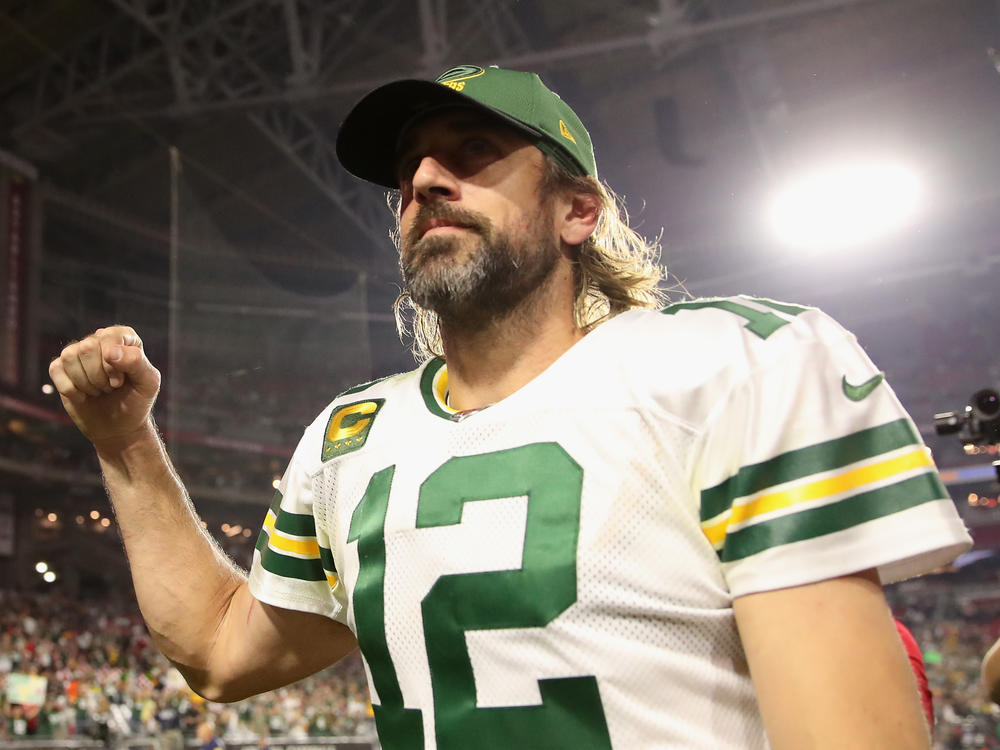Section Branding
Header Content
NFL denies telling Aaron Rodgers vaccinated people couldn't get or spread COVID-19
Primary Content
Updated November 8, 2021 at 4:41 PM ET
The NFL is batting away a claim by Green Bay Packers quarterback Aaron Rodgers that a league doctor told him people vaccinated against COVID-19 couldn't contract or spread the virus.
Rodgers made the claim in an appearance Friday on "The Pat McAfee Show" on Friday, defending his decision to not get vaccinated and criticizing the league for how it's treated unvaccinated players.
"One of the main docs said it's impossible for a vaccinated person to get COVID or spread COVID," Rodgers said during the interview. "We know now that information is totally false."
The NFL says Rodgers account is untrue
In an emailed statement, NFL spokesperson Brian McCarthy denied Rodger's version of events.
"No, it's not true," McCarthy said. "No doctor from the league or the joint NFL-NFLPA infectious disease consultants communicated with the player. If they had, they certainly would have never said anything like that."
Public health experts say the three coronavirus vaccines are shown to vastly reduce the likelihood of severe illness and death from COVID-19, but they are not 100% effective in blocking infection or preventing people from spreading the disease.
Rodgers missed Sunday's game due to his COVID status
Rodgers missed the Packers' 13-7 loss to the Kansas City Chiefs on Sunday after being placed on the league's reserve/COVID-19 list last week following a positive test. He is not vaccinated but previously said he was "immunized," which he clarified in the interview meant that he's following a separate protocol recommended by his personal medical team.
Rodgers said he couldn't get the Pfizer-BioNTech or Moderna vaccines because he's allergic to an ingredient in them. He also said that the Johnson & Johnson shot was "not even an option" for him in the spring after it was briefly shelved over blood clotting concerns, and said he'd heard of multiple people who'd had "adverse events" after getting the jab.
Rodgers said he asked the league to accept his immunization plan in lieu of getting vaccinated, but the league denied his request.
Corporate sponsors react to Rodgers' case
The Wisconsin health care company Prevea Health announced it was ending its partnership with Rodgers following his comments about the COVID-19 vaccine.
"Prevea Health remains deeply committed to protecting its patients, staff, providers and communities amidst the COVID-19 pandemic," the company said in a statement on Saturday. "This includes encouraging and helping all eligible populations to become vaccinated against COVID-19 to prevent the virus from further significantly impacting lives and livelihoods."
But the insurance giant State Farm called Rodgers a "great ambassador for our company" and did not announce plans to part ways with the star quarterback.
"We don't support some of the statements that he has made, but we respect his right to have his own personal point of view," the company said in a statement shared with NPR.
"Our mission at State Farm is to support safer, stronger communities. To that end, we encourage vaccinations, but respect everyone's right to make a choice based on their personal circumstances."
Still, marketing data shows that State Farm reduced the number of ads it ran featuring Rodgers after his comments, Action Network reported.
Copyright 2021 NPR. To see more, visit https://www.npr.org.

